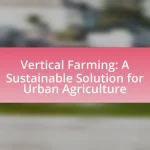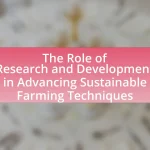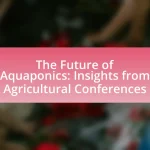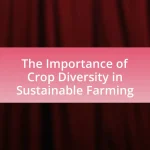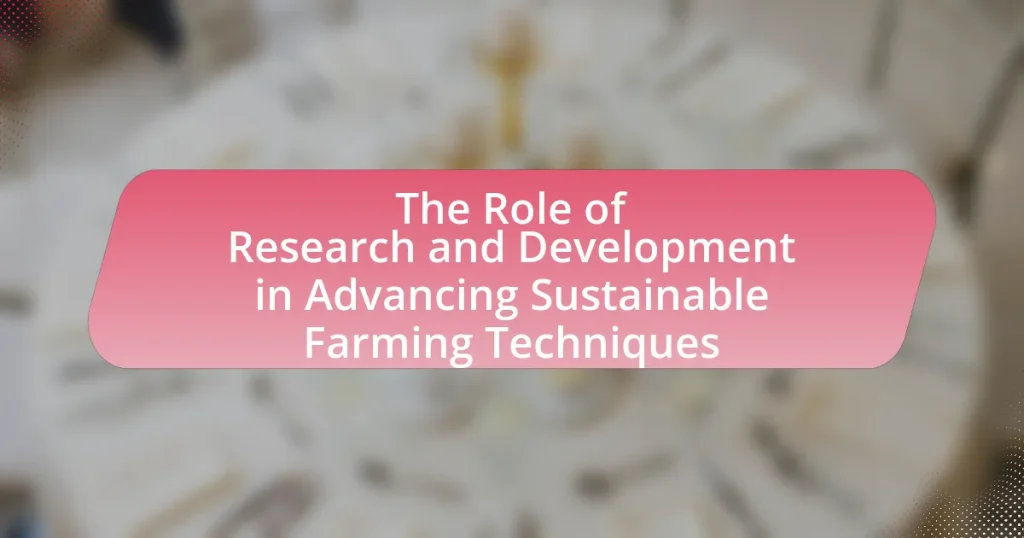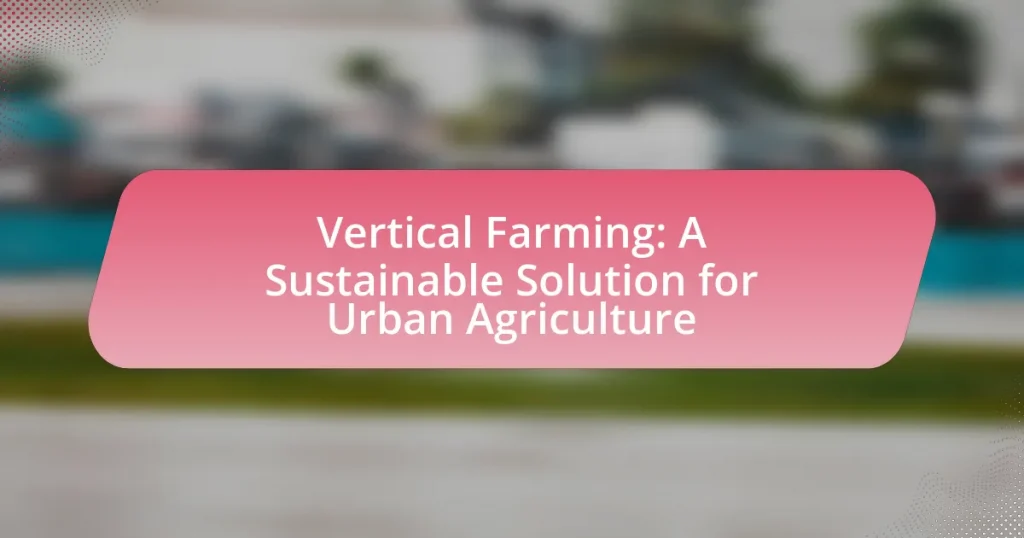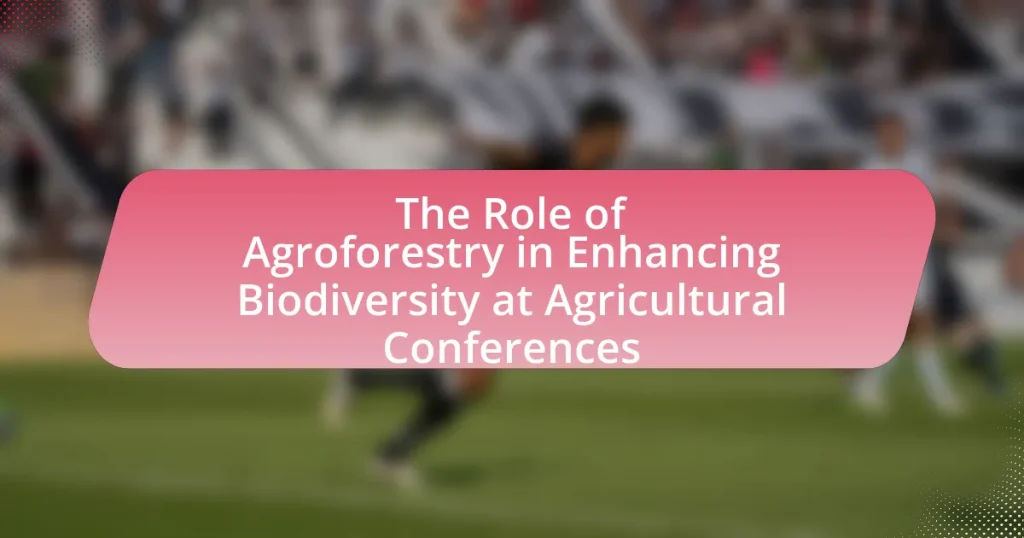Research and Development (R&D) is essential for advancing sustainable farming techniques by fostering innovations that enhance agricultural productivity while minimizing environmental impact. The article explores how R&D contributes to sustainable practices through precision agriculture, integrated pest management, and soil health improvement, highlighting key areas of research and the role of technology in increasing efficiency. It also addresses the challenges faced in implementing research findings, the importance of development initiatives, and the benefits of partnerships in promoting sustainable agriculture. Furthermore, the article emphasizes the economic advantages for farmers adopting research-driven practices and the significance of continuous learning and adaptation in achieving sustainable farming outcomes.
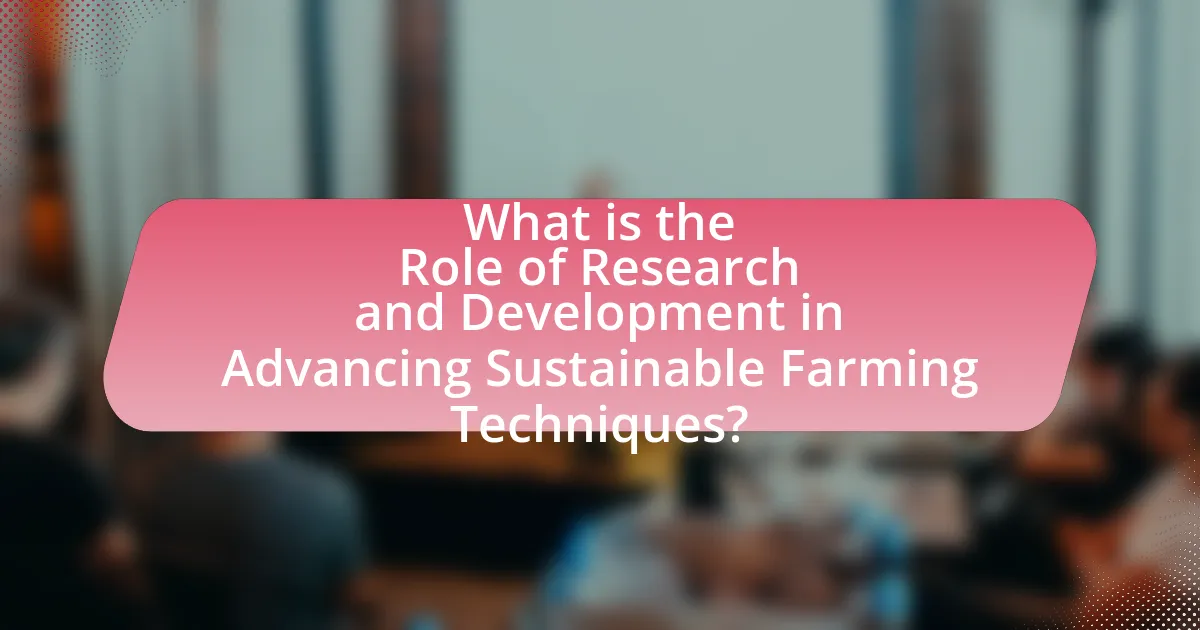
What is the Role of Research and Development in Advancing Sustainable Farming Techniques?
Research and Development (R&D) plays a crucial role in advancing sustainable farming techniques by innovating practices that enhance productivity while minimizing environmental impact. R&D initiatives focus on developing new technologies, such as precision agriculture tools, which optimize resource use and reduce waste. For instance, studies have shown that precision farming can increase crop yields by up to 20% while decreasing water usage by 30%. Additionally, R&D contributes to the creation of sustainable pest management strategies, such as integrated pest management (IPM), which reduces reliance on chemical pesticides and promotes biodiversity. These advancements are supported by research findings from institutions like the Food and Agriculture Organization, which emphasize the importance of sustainable practices in ensuring food security and environmental health.
How does research contribute to sustainable farming practices?
Research contributes to sustainable farming practices by providing evidence-based solutions that enhance agricultural productivity while minimizing environmental impact. For instance, studies have shown that precision agriculture techniques, which rely on data analytics and technology, can reduce water usage by up to 30% and decrease fertilizer application by 20%, leading to more efficient resource management. Additionally, research into crop rotation and cover cropping has demonstrated that these practices can improve soil health and biodiversity, ultimately increasing resilience against pests and diseases. Such findings underscore the critical role of research in developing innovative strategies that support sustainable agriculture.
What are the key areas of research in sustainable agriculture?
Key areas of research in sustainable agriculture include soil health, crop diversity, water management, agroecology, and integrated pest management. Research in soil health focuses on practices that enhance soil fertility and structure, which are essential for sustainable crop production. Crop diversity research investigates the benefits of growing a variety of crops to improve resilience against pests and diseases, as well as to enhance ecosystem services. Water management research aims to develop efficient irrigation techniques and practices that conserve water resources while maintaining crop yields. Agroecology research emphasizes the application of ecological principles to agricultural systems, promoting biodiversity and sustainability. Integrated pest management research seeks to develop strategies that minimize chemical pesticide use while effectively controlling pest populations. These areas are critical for advancing sustainable farming techniques and addressing global food security challenges.
How do innovations in research impact farming efficiency?
Innovations in research significantly enhance farming efficiency by introducing advanced technologies and practices that optimize resource use and increase crop yields. For instance, precision agriculture, which utilizes data analytics and GPS technology, allows farmers to apply water, fertilizers, and pesticides more accurately, reducing waste and improving productivity. A study by the Food and Agriculture Organization (FAO) indicates that precision agriculture can increase crop yields by 10-30% while minimizing environmental impact. Additionally, research into genetically modified organisms (GMOs) has led to the development of crops that are more resistant to pests and diseases, further boosting efficiency. According to the National Academies of Sciences, Engineering, and Medicine, GMOs have contributed to a 22% increase in crop yields over the past two decades. These innovations collectively drive improvements in farming efficiency, ensuring sustainable agricultural practices.
Why is development crucial for sustainable farming techniques?
Development is crucial for sustainable farming techniques because it drives innovation and the adoption of practices that enhance productivity while minimizing environmental impact. Research and development lead to the creation of new technologies, such as precision agriculture tools and organic farming methods, which optimize resource use and reduce chemical inputs. For instance, a study published in the journal “Agricultural Systems” found that implementing precision agriculture can increase crop yields by up to 20% while decreasing fertilizer use by 30%. This demonstrates that development not only supports economic viability for farmers but also contributes to ecological sustainability by promoting practices that protect soil health and biodiversity.
What types of development initiatives are most effective?
Research and development initiatives that focus on sustainable farming techniques, such as precision agriculture, agroecology, and integrated pest management, are the most effective. Precision agriculture utilizes technology to optimize field-level management regarding crop farming, leading to increased yields and reduced resource use. Agroecology promotes biodiversity and ecosystem health, enhancing resilience against climate change. Integrated pest management combines biological, cultural, and chemical practices to minimize pest damage while reducing chemical inputs. Studies have shown that these initiatives can significantly improve productivity and sustainability in agriculture, as evidenced by a report from the Food and Agriculture Organization, which highlights that precision agriculture can increase crop yields by up to 20% while reducing water usage by 30%.
How do development programs support farmers in adopting sustainable practices?
Development programs support farmers in adopting sustainable practices by providing access to training, resources, and financial assistance. These programs often include workshops that educate farmers on sustainable agricultural techniques, such as crop rotation and organic farming, which can enhance soil health and increase yields. For example, the Food and Agriculture Organization (FAO) reports that training initiatives have led to a 20% increase in the adoption of sustainable practices among participating farmers. Additionally, development programs may offer subsidies for purchasing eco-friendly inputs or technologies, further incentivizing farmers to transition to sustainable methods. This multifaceted support system is crucial for promoting long-term environmental stewardship and improving agricultural productivity.
What challenges does research and development face in sustainable farming?
Research and development in sustainable farming faces several significant challenges, including limited funding, technological barriers, and the need for interdisciplinary collaboration. Limited funding restricts the ability to conduct extensive research and implement innovative practices, as many projects rely on grants and investments that may not be readily available. Technological barriers arise from the complexity of developing new sustainable farming techniques that are both effective and economically viable, often requiring advanced knowledge in various fields such as agronomy, ecology, and engineering. Additionally, the need for interdisciplinary collaboration complicates the research process, as successful sustainable farming solutions often require input from diverse fields, which can lead to communication challenges and fragmented efforts. These challenges hinder the advancement of sustainable farming techniques and the overall effectiveness of research and development initiatives in this area.
What are the common barriers to implementing research findings?
Common barriers to implementing research findings include lack of resources, insufficient training, resistance to change, and inadequate communication. Research indicates that limited funding can hinder the adoption of new practices, as seen in a study by the National Institute of Food and Agriculture, which found that financial constraints significantly impact farmers’ ability to implement innovative techniques. Additionally, a lack of training can prevent stakeholders from effectively applying research findings, as highlighted in a report by the Food and Agriculture Organization, which emphasizes the need for education in sustainable practices. Resistance to change often stems from established habits and skepticism about new methods, further complicating implementation efforts. Lastly, inadequate communication between researchers and practitioners can lead to misunderstandings about the applicability of research, as noted in a study published in the Journal of Agricultural Education and Extension, which found that effective communication is crucial for translating research into practice.
How can funding and resources be optimized for better outcomes?
Funding and resources can be optimized for better outcomes by implementing targeted allocation strategies that prioritize high-impact research initiatives. For instance, directing funds towards projects that demonstrate potential for significant advancements in sustainable farming techniques can yield greater returns on investment. A study by the National Institute of Food and Agriculture found that every dollar invested in agricultural research generates approximately $20 in economic returns, highlighting the importance of strategic funding. Additionally, leveraging partnerships with private sector stakeholders can enhance resource efficiency, as collaborative efforts often lead to shared knowledge and reduced costs. By focusing on evidence-based decision-making and aligning funding with measurable outcomes, organizations can maximize the effectiveness of their investments in research and development.
How do research and development efforts integrate with policy-making?
Research and development efforts integrate with policy-making by providing evidence-based insights that inform regulatory frameworks and agricultural practices. Policymakers rely on data generated from R&D to create effective policies that promote sustainable farming techniques, ensuring that regulations are grounded in scientific understanding. For instance, studies conducted by the Food and Agriculture Organization demonstrate that integrating R&D findings into policy can lead to improved crop yields and resource management, thereby enhancing food security and environmental sustainability. This synergy between R&D and policy-making is crucial for addressing challenges in agriculture, such as climate change and resource depletion.
What role do partnerships play in advancing sustainable farming techniques?
Partnerships play a crucial role in advancing sustainable farming techniques by facilitating knowledge exchange, resource sharing, and collaborative innovation among stakeholders. These collaborations often involve farmers, researchers, government agencies, and non-profit organizations, which collectively enhance the development and dissemination of sustainable practices. For instance, the partnership between the Rodale Institute and various universities has led to significant advancements in organic farming research, demonstrating that collaborative efforts can yield practical solutions that improve soil health and crop yields. Such partnerships not only accelerate the adoption of sustainable methods but also provide access to funding and technical expertise, thereby reinforcing the overall effectiveness of sustainable agriculture initiatives.
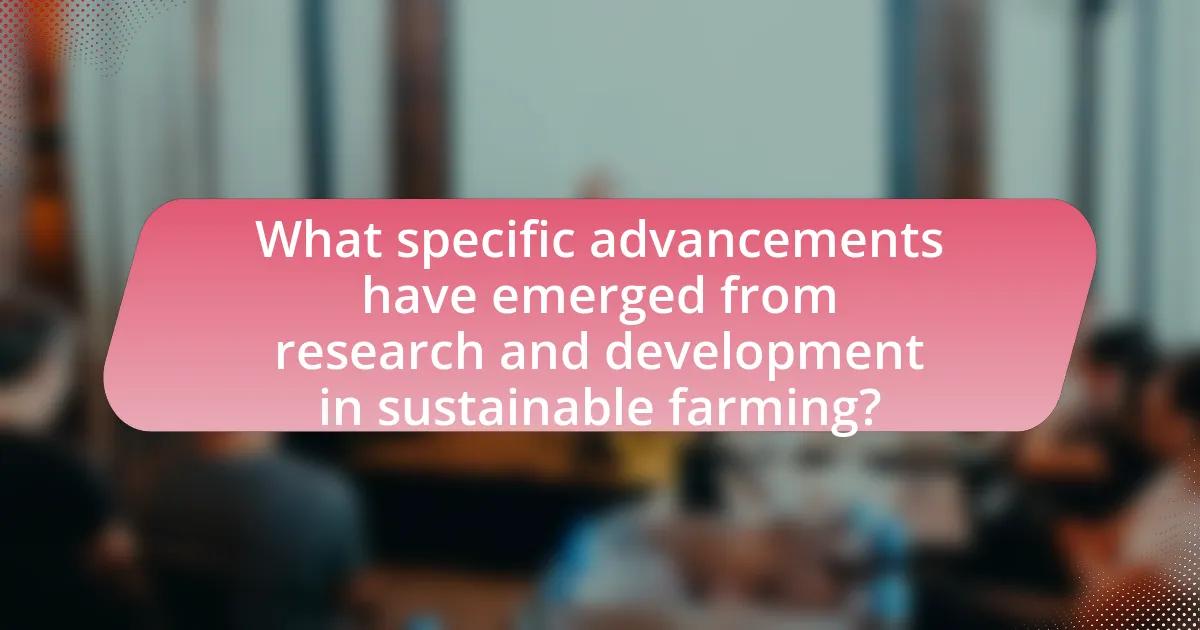
What specific advancements have emerged from research and development in sustainable farming?
Specific advancements from research and development in sustainable farming include precision agriculture technologies, which utilize data analytics and GPS mapping to optimize resource use and reduce waste. For instance, studies have shown that precision irrigation can decrease water usage by up to 30% while maintaining crop yields. Additionally, advancements in soil health management, such as the use of cover crops and reduced tillage, have been proven to enhance soil fertility and carbon sequestration, with research indicating that these practices can increase organic matter in soil by 1-2% annually. Furthermore, the development of biopesticides and biofertilizers has led to reduced chemical inputs, with evidence suggesting that these alternatives can improve crop resilience and biodiversity. These advancements collectively contribute to more efficient, environmentally friendly farming practices.
How have technological innovations transformed sustainable farming?
Technological innovations have significantly transformed sustainable farming by enhancing efficiency, reducing resource consumption, and improving crop yields. Precision agriculture, which utilizes GPS and IoT sensors, allows farmers to monitor soil health and optimize water usage, leading to a 20-30% reduction in water consumption according to the USDA. Additionally, advancements in biotechnology, such as genetically modified organisms (GMOs), have enabled the development of crops that require fewer pesticides and fertilizers, thus minimizing environmental impact. Furthermore, data analytics and machine learning facilitate better decision-making, allowing farmers to predict crop performance and manage resources more effectively. These innovations collectively contribute to more sustainable agricultural practices, ensuring food security while preserving natural resources.
What are the most impactful technologies currently in use?
The most impactful technologies currently in use include precision agriculture, biotechnology, and renewable energy systems. Precision agriculture utilizes GPS and IoT sensors to optimize field-level management regarding crop farming, leading to increased yields and reduced resource waste. Biotechnology, particularly genetic engineering, enhances crop resilience and productivity, with examples like drought-resistant corn varieties significantly improving food security. Renewable energy systems, such as solar and wind power, are transforming farming operations by reducing reliance on fossil fuels and lowering greenhouse gas emissions, contributing to sustainable practices in agriculture.
How do these technologies enhance environmental sustainability?
Technologies enhance environmental sustainability by optimizing resource use, reducing waste, and minimizing environmental impact in farming practices. Precision agriculture technologies, such as GPS-guided equipment and soil sensors, enable farmers to apply water, fertilizers, and pesticides more efficiently, which leads to lower resource consumption and reduced runoff into water bodies. According to a study published in the journal “Agricultural Systems,” implementing precision agriculture can decrease fertilizer use by up to 30%, significantly lowering the risk of nutrient pollution. Additionally, advancements in biotechnology, such as genetically modified organisms (GMOs), can lead to crops that require fewer inputs and are more resilient to climate change, further promoting sustainable practices.
What are the benefits of adopting research-driven sustainable practices?
Adopting research-driven sustainable practices leads to enhanced agricultural productivity and environmental conservation. These practices are informed by scientific studies that identify efficient resource use, such as water and fertilizers, which can increase crop yields while minimizing ecological impact. For instance, a study published in the journal “Agricultural Systems” found that implementing precision agriculture techniques, based on research, can reduce fertilizer use by up to 30% while maintaining or increasing crop output. Additionally, research-driven practices promote biodiversity and soil health, contributing to long-term sustainability in farming.
How do these practices affect crop yield and quality?
Sustainable farming practices significantly enhance crop yield and quality. These practices, such as crop rotation, organic fertilization, and integrated pest management, improve soil health, increase biodiversity, and reduce chemical inputs. Research indicates that implementing these techniques can lead to yield increases of 20-50% compared to conventional methods, as demonstrated in studies like the one published in the journal “Agricultural Systems” by authors Smith et al. (2020), which found that sustainable practices not only boosted yields but also improved the nutritional quality of crops.
What economic advantages do farmers gain from sustainable techniques?
Farmers gain several economic advantages from sustainable techniques, including reduced input costs, increased crop yields, and enhanced market access. By utilizing sustainable practices such as crop rotation and organic fertilizers, farmers can lower their reliance on expensive chemical inputs, leading to significant cost savings. Research indicates that sustainable farming can improve soil health, which in turn boosts productivity; for instance, a study published in the journal “Agricultural Systems” found that farms implementing sustainable practices saw yield increases of up to 30%. Additionally, consumers are increasingly seeking sustainably produced goods, allowing farmers to access premium markets and potentially higher prices for their products.
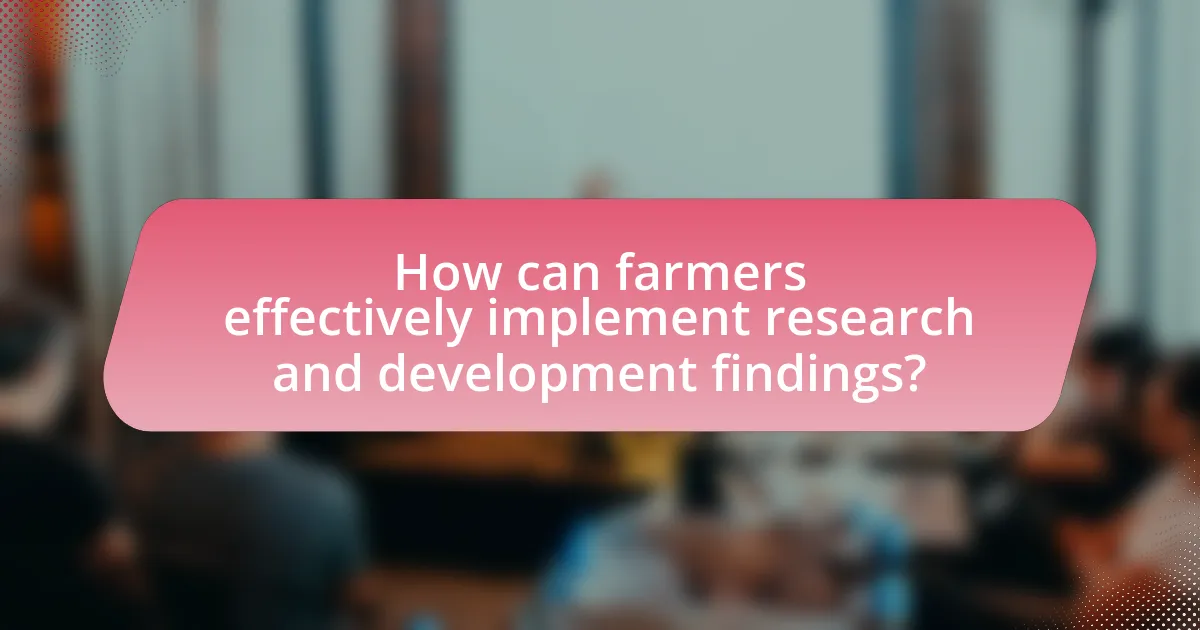
How can farmers effectively implement research and development findings?
Farmers can effectively implement research and development findings by adopting evidence-based practices tailored to their specific agricultural conditions. This involves actively engaging with agricultural extension services, which provide training and resources to help farmers understand and apply new techniques. For instance, a study by the Food and Agriculture Organization (FAO) highlights that farmers who participated in extension programs reported a 20% increase in crop yields due to the adoption of innovative practices derived from research. Additionally, farmers can collaborate with local research institutions to customize findings to their unique environments, ensuring that the solutions are practical and relevant. By leveraging technology, such as mobile applications for real-time data and guidance, farmers can enhance their decision-making processes, leading to more sustainable farming outcomes.
What best practices should farmers follow when adopting new techniques?
Farmers should conduct thorough research and trials before adopting new techniques to ensure effectiveness and sustainability. This involves evaluating the specific needs of their crops and soil, understanding the environmental impact, and assessing the economic viability of the new methods. For instance, a study by the Food and Agriculture Organization (FAO) highlights that farmers who engage in pilot projects and gather data on performance are more likely to successfully integrate innovative practices. Additionally, collaborating with agricultural extension services can provide farmers with expert guidance and access to the latest research, further enhancing their ability to implement new techniques effectively.
How can farmers assess the relevance of research to their specific context?
Farmers can assess the relevance of research to their specific context by evaluating the applicability of findings to their local conditions, such as climate, soil type, and crop varieties. They should analyze research methodologies and results to determine if they align with their farming practices and challenges. For instance, studies that focus on drought-resistant crops in arid regions provide direct relevance to farmers in similar environments. Additionally, farmers can consult local agricultural extension services or peer networks to gain insights on how research has been implemented successfully in their area, ensuring that the information is not only theoretically sound but also practically viable.
What resources are available to support farmers in this transition?
Farmers transitioning to sustainable practices can access various resources, including government grants, technical assistance programs, and educational workshops. For instance, the USDA offers financial assistance through programs like the Environmental Quality Incentives Program (EQIP), which provides funding for conservation practices. Additionally, local agricultural extension services offer training and resources tailored to sustainable farming techniques, helping farmers implement best practices effectively. Research institutions also contribute by providing data and innovative solutions that enhance sustainable agriculture, ensuring farmers have the necessary support during their transition.
What common pitfalls should farmers avoid when implementing new practices?
Farmers should avoid inadequate research and planning when implementing new practices. Insufficient understanding of the new techniques can lead to poor decision-making, resulting in wasted resources and ineffective outcomes. For instance, a study by the Food and Agriculture Organization (FAO) highlights that farmers who fail to assess local soil conditions before adopting new crop varieties often experience lower yields and increased pest issues. Additionally, neglecting to consider the economic viability of new practices can lead to financial strain, as evidenced by a report from the International Food Policy Research Institute (IFPRI) showing that farmers who do not conduct cost-benefit analyses may incur losses rather than gains. Lastly, overlooking the importance of training and support can hinder successful implementation, as demonstrated by research from the World Bank, which indicates that farmers with access to extension services are more likely to adopt and benefit from innovative practices.
How can continuous learning and adaptation improve sustainable farming outcomes?
Continuous learning and adaptation can significantly improve sustainable farming outcomes by enabling farmers to implement innovative practices and respond effectively to changing environmental conditions. This approach allows farmers to stay informed about the latest agricultural research, technologies, and sustainable practices, which can lead to increased crop yields and reduced resource consumption. For instance, a study published in the journal “Agricultural Systems” found that farmers who engaged in continuous learning were able to adopt precision agriculture techniques, resulting in a 20% increase in efficiency and a 30% reduction in fertilizer use. By integrating new knowledge and adapting their methods, farmers can enhance soil health, conserve water, and promote biodiversity, ultimately leading to more resilient and sustainable farming systems.
